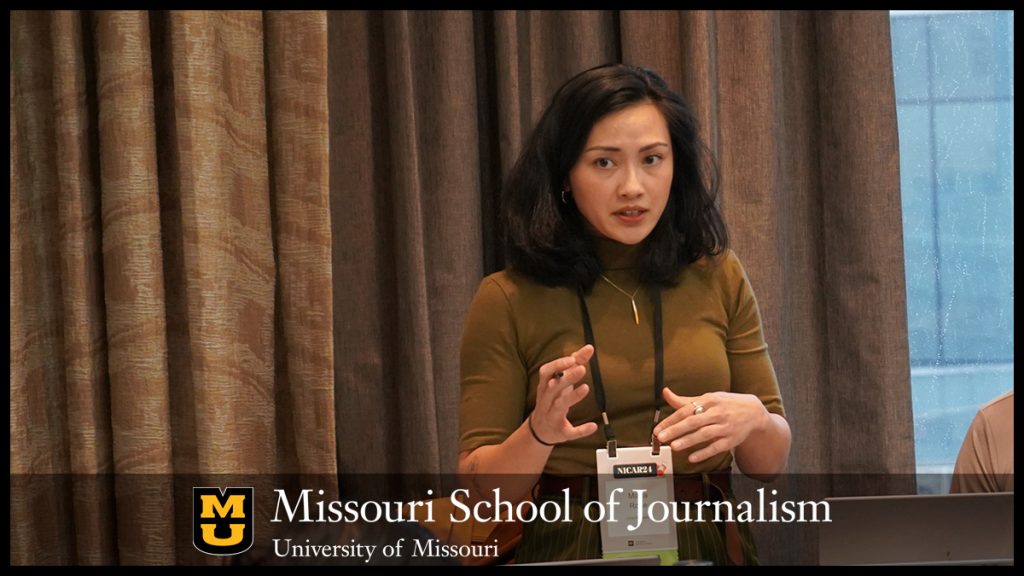Science and data journalist Maria Parazo Rose to deliver Smith/Patterson Lecture

Maria Parazo Rose gives a presentation at NICAR24, an annual data journalism conference, this past March in Baltimore.
COLUMBIA, Mo. (April 24, 2024) — The Missouri School of Journalism will welcome Maria Parazo Rose, a journalist and spatial data analyst at Grist, for the Smith/Patterson Science Journalism Lecture on Thursday, April 25. The lecture and Q&A, which is free and open to the public, will take place at 6 p.m. in Smith Forum, with free pizza available at 5:30.
Rose’s work, which often examines how land use and climate issues intersect with marginalized communities, has been published in New York Focus, Grist, Popular Science, The Allegheny Front and NPR. During her lecture, she will take students and other attendees behind the scenes of “Misplaced Trust,” a recent large-scale reporting project — authored by Rose and six other reporters supported by the Pulitzer Center — about the ways public universities continuously profit off of indigenous land.
“Grist has done a powerful follow-up to the groundbreaking Land Grab Universities project,” said Sara Hiles, director of the Smith/Patterson lecture program and an associate professor at the School of Journalism. “Maria has been generous in sharing her data reporting methods so other journalists can expand on the work.”
The Smith/Patterson Science Journalism Lecture brings a respected journalist to campus each semester through a partnership with the Pulitzer Center. Alumni Russ and Gail Smith founded the program in honor of pioneering science journalism professor Joye Patterson, who taught at the Journalism School from 1965 to 1989. The program includes an annual $5,000 student fellowship, the winner of which will be announced at the lecture.
Grist has done a powerful follow-up to the groundbreaking Land Grab Universities project. Maria has been generous in sharing her data reporting methods so other journalists can expand on the work.
Sara Hiles
In Rose’s case, an important theme of her lecture will be the role that data journalism can play in presenting new, compelling dimensions to complex issues. For example, “The extractive industries filling public university coffers on stolen land,” the first story in the “Misplaced Trust” series, breaks down the true cost of college attendance to interrogate whether financial aid policies adequately support indigenous populations. The story also documents the profits some public universities receive from resource extraction on state trust lands originally populated by indigenous people.
“Data in these circumstances is powerful because it can point to an injustice and then show the receipts,” Rose said. “A lot of articles have personal stories that exemplify these issues, but to show the data behind it can point to much bigger trends.”
Rose also plans to offer advice drawn from her firsthand experiences to students and journalists looking to learn more about how science and data journalism works, particularly on long-form, collaborative projects.
“Coming up with a good question — the right question to define the data that you have or need — and then asking a follow-up question about that is an art,” Rose said. “At the heart of it, these are big questions: Whose land is it? What does jurisdiction over these places look like?”
In addition to speaking at Smith Forum, Rose will also speak to journalism classes taught by Hiles and Mark Horvit, providing lessons tailored to their specific classes and interests, such as the logistics of identifying state trust lands and gathering data on land use.
About the Smith/Patterson Lecture Series
The Smith/Patterson Science Journalism Fellowship and Lecture Series was established in 2008 by School of Journalism alumnus Russell G. Smith II and his wife, Gail, to honor Joye Patterson, Smith’s former professor and mentor. The program is also part of a partnership with the Pulitzer Center established in 2017 to enhance the School’s emphasis on science, health and environmental journalism.
Updated: April 24, 2024